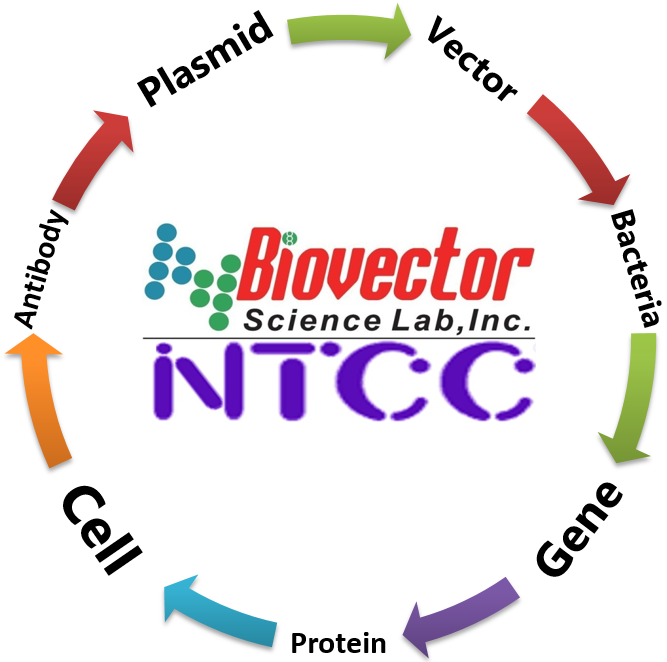pTAL-SEAP细胞信号通路报告载体-BioVector NTCC质粒载体菌种细胞基因保藏中心
- 价 格:¥9835
- 货 号:pTAL-SEAP细胞信号通路报告载体
- 产 地:北京
- BioVector NTCC典型培养物保藏中心
- 联系人:Dr.Xu, Biovector NTCC Inc.
电话:400-800-2947 工作微信:1843439339 (QQ同号)
邮件:Biovector@163.com
手机:18901268599
地址:北京
- 已注册
pTAL-SEAP
Description
pTAL-SEAP is designed for analyzing enhancer sequences by assaying for expression of thesecreted alkaline phosphatase (SEAP) gene. This vector contains a TATA-like promoter (PTAL)region from the Herpes simplex virus thymidine kinase (HSV-TK) promoter. Putative enhancerscan be inserted into the MCS. The SEAP coding sequence is followed by the SV40 latepolyadenylation signal to ensure proper, efficient processing of the SEAP transcript in eukaryoticcells. Located upstream of the MCS is a synthetic transcription blocker (TB), which iscomposed of adjacent polyadenylation and transcription pause sites for reducing backgroundtranscription (1). The vector backbone also contains an f1 origin for single-stranded DNAproduction, a pUC origin of replication, and an ampicillin resistance gene for propagationand selection in E. coli.UsepTAL-SEAP is ideal for use as a negative control or for studying putative enhancers that areinserted upstream of the SEAP reporter gene. The secreted SEAP enzyme is assayed directlyfrom the culture medium using one of Clontech’s Great EscAPe™ SEAP Detection Kits (Cat.Nos. 631701, 631704). In addition, the SEAP assay permits time-course studies not possiblewith assays dependent on cell lysates. The pTAL-SEAP Vector can be transfected into mam- malian cells by any standard method. For selecting stable clones, cotransfect with a vectorcontaining an antibiotic resistance gene, such as neomycin, hygromycin, or puromycin.
Location of features
• Multiple Cloning Site: 1–41• TATA-like promoter (PTAL): 42–190• Secreted alkaline phosphatase (SEAP) gene: SEAP coding sequences: start codon (ATG): 218–220; stop codon: 1775–1777 signal peptide: 218–268 mature protein: 269–1774 C-terminal extension to SEAP: 1736–1774• SV40 late mRNA polyadenylation signal: 1888–1893 mRNA 3' end: 1906• pUC plasmid replication origin: 2286–2929• Ampicillin resistance gene: Promoter: –35 region: 4012–4007; –10 region: 3984–3979 Transcription start point: 3972 Ribosome binding site: 3949–3945 β-lactamase coding sequences: start codon (ATG): 3937–3935; stop codon: 3079–3077 β-lactamase signal peptide: 3937–3869 β-lactamase mature protein: 3868–3080• f1 single-strand DNA origin (packages the noncoding strand of SEAP): 4069–4524• Transcription blocker (TB): 4655–4808 Synthetic polyadenylation site (2): 4655–4751 Transcription pause site from human α2 globin gene (3): 4717–4808Recommended sequencing primer 5´ of MCS: 4632–4649 (5'-CGGGAGGTACTTGGAGCG-3')Propagation in E. coli• Suitable host strains: DH5α and other general purpose strains. Single-stranded DNA production requiresa host containing an F' episome such as JM109.• Selectable marker: plasmid confers resistance to ampicillin (50 µg/ml) to E. coli hosts.• E. coli replication origin: pUC• Copy number: ~500• Plasmid incompatibility group: pMB1/Col E1References1. Eggermont, J. & Proudfoot, N. (1993) EMBO J. 12:2539–2548.2. Levitt, N., et al. (1989) Genes Dev. 3:1019–1025.3. Enriquez-Harris, P. et al. (1991) EMBO J. 10:1833–1842.
Map:

The Pathway Profiling Systems provide a means to assess cell signaling pathway activation in vivo. These systems consist of sets of vectors that each contain a distinct cis-acting enhancer element upstream of a reporter gene. A single transfection experiment provides a profile of the transcription factors that are affected by a given stimulus, drug candidate, or gene product of interest.
BioVector NTCC质粒载体菌种细胞基因保藏中心 [Supplier来源] http://www.biovector.net
您正在向 biovector.net 发送关于产品 pTAL-SEAP细胞信号通路报告载体-BioVector NTCC质粒载体菌种细胞基因保藏中心 的询问
- 公告/新闻




